War on Waste

Help us win the war on waste!
JCU sends 700,000kg of waste to landfill every year and our recycling rate is 20%.
Help us reach a 70% recycling rate and
a overall reduction of general waste of 20% by 2030
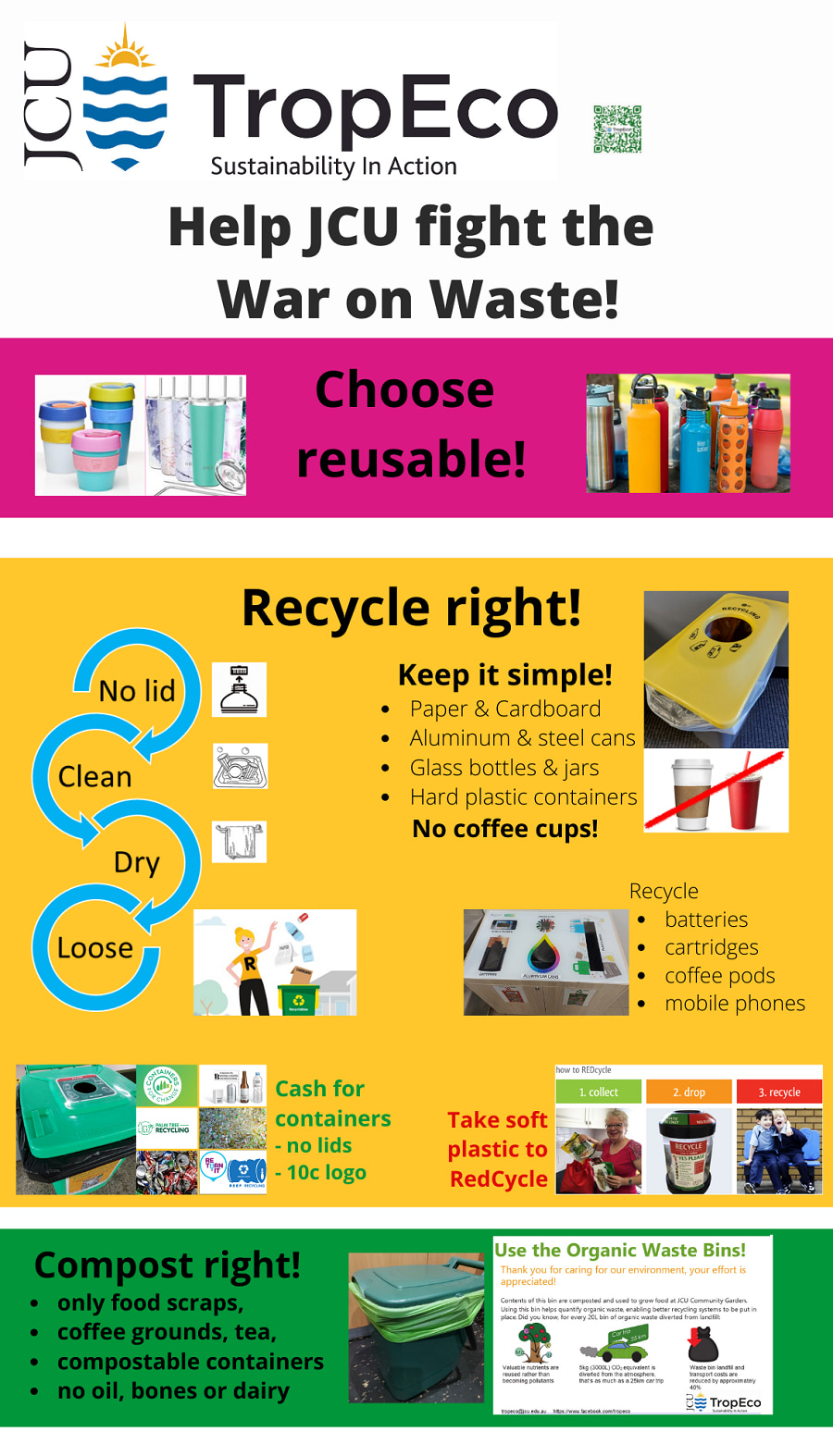
We need your help to win the War on Waste. It is up to all students and staff at JCU to reduce waste, recycle right and minimise contamination.
Follow the Waste Reduction Hierarchy to win the war on waste
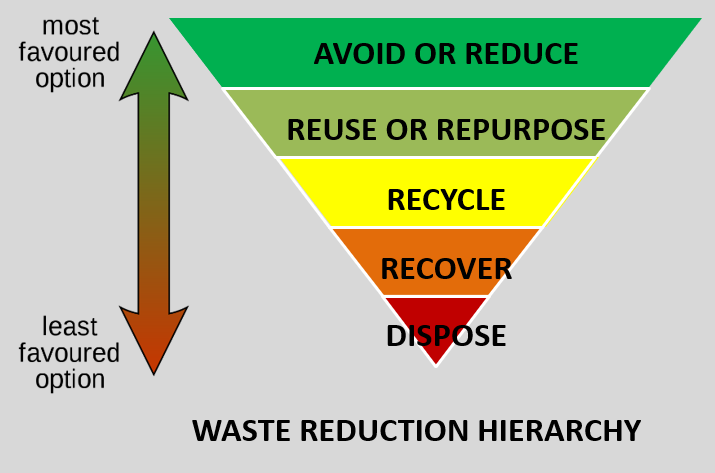
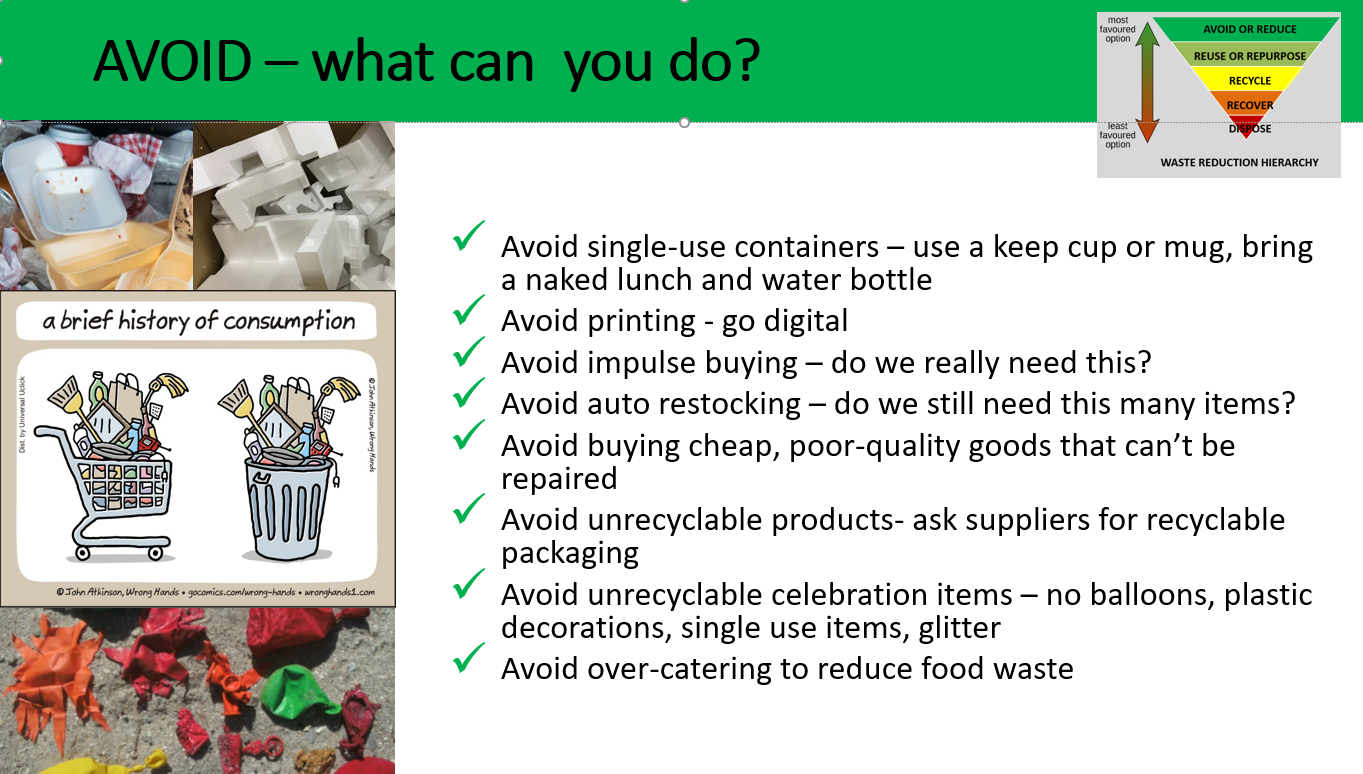
Avoid - What can you do?
- Avoid single-use containers - use a keep up or mug, bring a naked lunch and water bottle
- Avoid printing - go digital
- Avoid impulse buying - do we really need this?
- Avoid auto restocking - do we still need this many items?
- Avoid buying cheap, poor-quality goods that can't be repaired
- Avoid unrecyclable products - ask supplier for recyclable packaging
- Avoid unrecyclable celebration items - no balloons, plastic decorations, single use items, glitter
- Avoid over-catering to reduce food waste
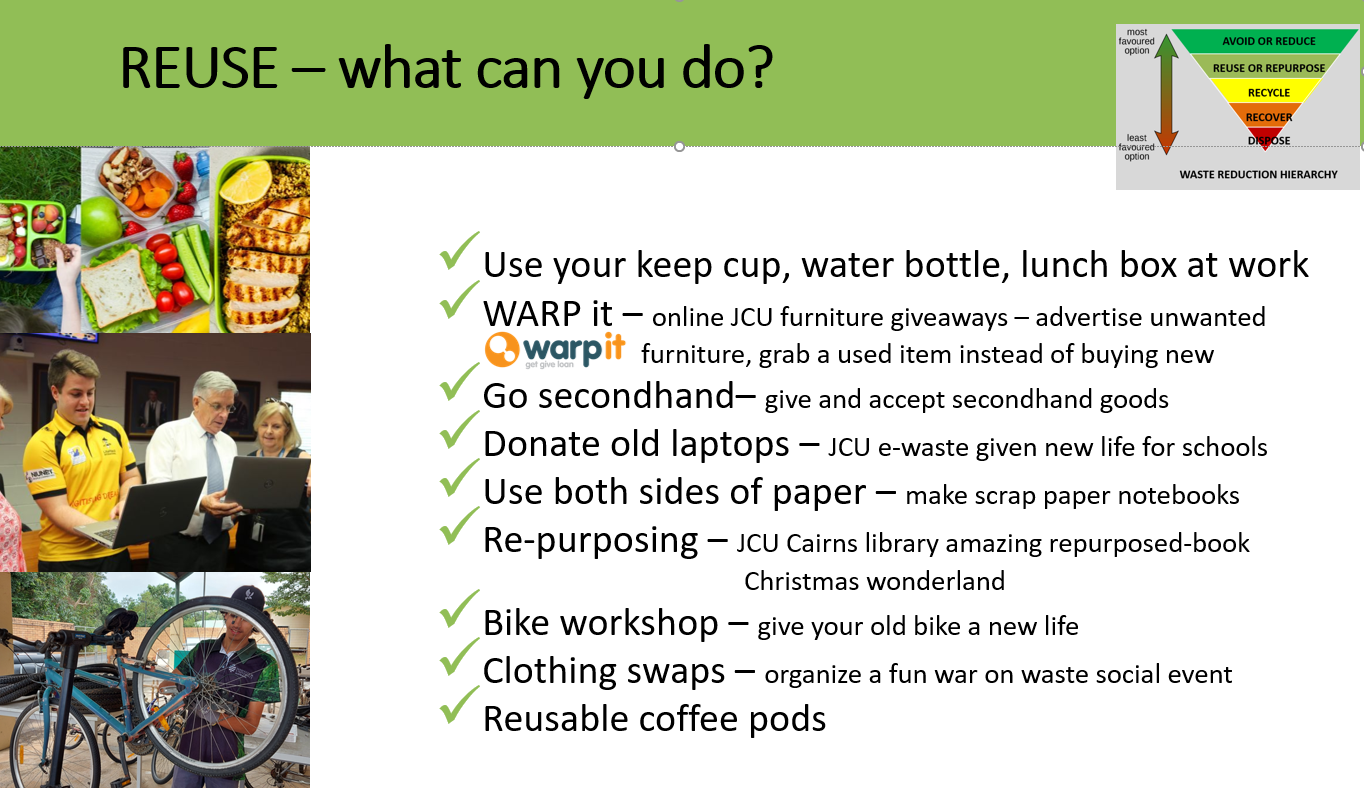
Reuse - what can you do?
- You can help reduce the amount of waste sent to landfill by bringing your own coffee cup, water bottle, reusable lunch boxes and bag.
- Wrap it - online JCU furniture giveaways
- Go secondhand - give and accept secondhand goods
- Donate old laptops - JCU e-waste given new life for schools
- Use both sides if paper - make scrap paper notebooks
- Re-purposing - JCU Cairns library amazing repurposed-book Christmas wonderland
- Bike workshop
- Clothing swaps - organise a fun war on waste social event
- reusable coffee pods
Please do the right thing, use the right bin. Follow the links below to find out more:
The JCU Waste Management Plan provide a comprehensive and easy to navigate guide on waste management at JCU. Please take the time to read and learn how you can sort your waste correctly and recycle right.
Contamination of non-recyclable items, liquids and food can result in all items in a yellow bin going to landfill
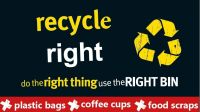
Keep It Simple!
- Paper and cardboard
- Glass bottles and jars
- Aluminum and steel cans
- Hard plastic
- No coffee cups!
Pour liquid and ice out of cold beverage takeaway cups, and put lid and straw in red bin. These cups are a big cause of contamination, why not bring your own reusable cup.
These items go in the general waste red bin:
- coffee cups
- lids and straws
- plastic bags and other soft plastics
- food and liquids
Lots of things including batteries, paper, e-waste, metals, and food waste. The JCU Waste Reduction Management Plan provide a comprehensive and easy to navigate guide on waste management at JCU.
- co-mingled recycling - paper, glass, hard plastic, aluminum and steel cans
- cardboard boxes
- unwanted furniture through Warp It
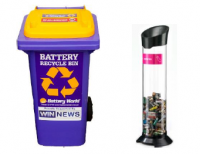

- e-waste (electronic items)
- battery recycling
- fluorescent tubes
- green waste
- food waste
We're always looking for staff and students to help us win the War on Waste. Here are some simple things you can do to help:
- Remember the waste hierarchy - Avoid, Reduce, Reuse, Recycle. Try not to bring disposable items to campus.
- Set up a RedCycle collection roster in your accommodation College, or tearoom, to share taking soft plastics to a RedCycle collection bin
- Collect cans and bottles for containers for change, these provide a much higher quality and more valuable product for recyclers than comingled recycling. Fundraise for a student wellbeing initiative!
- Get on social media and encourage others to support our campaign by using the hashtag #waronwaste and share our webpage.
- Volunteer with TropEco as a Sustainability Intern or staff champion and help implement programs to fight the War on Waste.
- Organise a TropEco representative to attend a class, staff meeting or morning tea to talk about the War on Waste campaign.
How you can Help
War on Waste - Soft Plastics
Can I recycle my coffee cup?
The short answer is no. Disposable coffee cups have a thin plastic liner that means the recycling facilities cannot process them, therefore they all end up in landfill. Compostable coffee cups are not recyclable in our yellow bins but can go in the compost bin. A better option is to bring your own reusable coffee cup, or mug which is supported by most vendors on campus, who provide a discount for bringing your own cup.
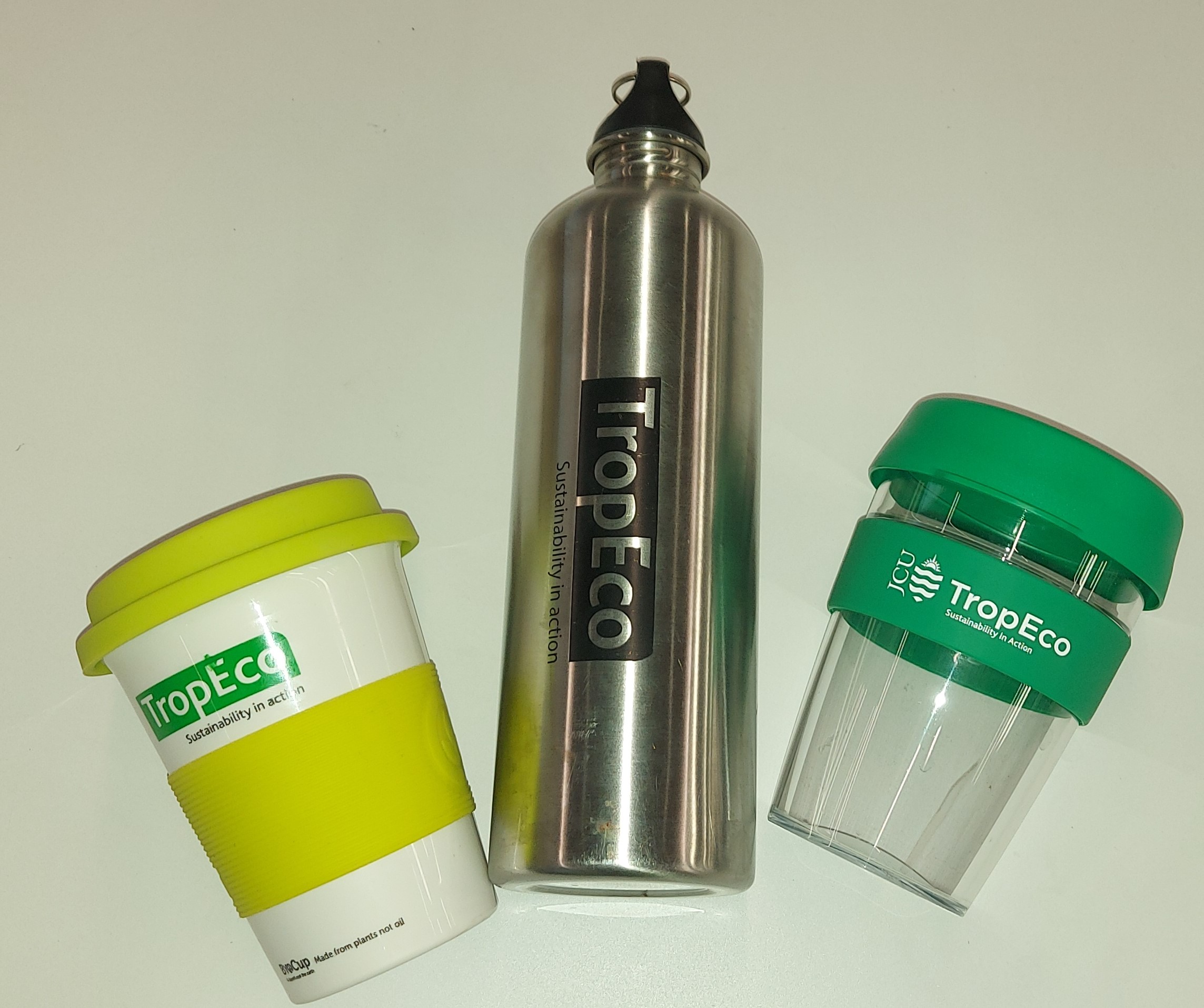
Does my recycling end up going to landfill anyway?
No. This is a common misconception and is entirely incorrect.
The recycling process works as follows:
1. Staff and students place recyclable items in the correct bin.
2. Biniris cleaning staff empty yellow recycling bins, check for contamination and place the recyclables in the comingled yellow skip for collection by our waste contractor Cleanaway. If the recycle bin contamination rate is higher than 10% it is disposed of as general waste, so it is important that staff and students do their bit to minimise contamination.
3. JCU's waste contractors collect the recycling and transport it to the local Materials Recovery Facility (MRF), where recyclables are sorted, baled and sent for recycling.
JCU receives monthly reports from our waste contractors for the Cairns and Townsville campuses showing the total waste sent to landfill and total recycling. We also get a report from the MRF on the breakdown of the recycling and amount of general waste in the recycling. This way we can ensure that the recycling is actually occurring once it leaves JCU.
What types of plastic can I recycle?
Hard plastic items that contain a recycle symbol with the numbers 1-7 can be recycled in the regular yellow recycle bin. A good rule of thumb is that if you can scrunch it up in your hand, then it is not recyclable in the normal recycle bin. Soft plastic items such as plastic bags, food wrappers, bubble wrap, courier satchel can be recycled through the RedCycle program. Collect soft plastics and take them to the Redcycle bin at any Woolworths or Coles for recycling. Please ensure all plastic items these are free from food scraps or liquids when recycling.
To find out more:
- Check out our fact sheets on Recycling for Students and Recycling for Staff
- Contact TropEco tropeco@jcu.edu.au